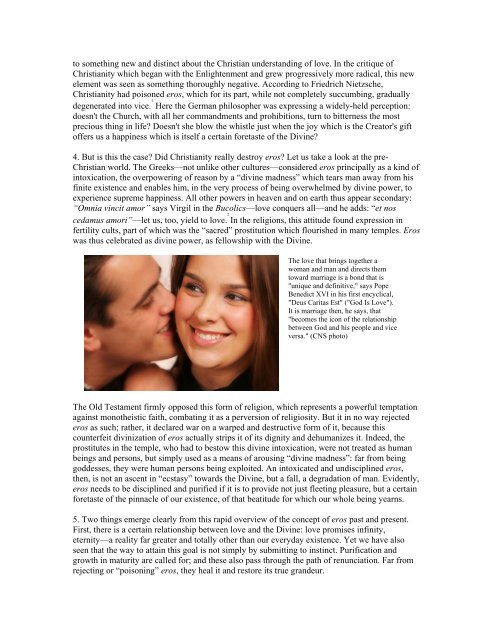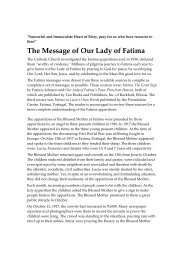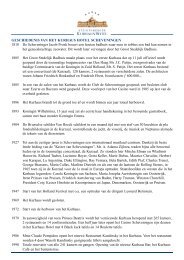to something new and distinct about the Christian understanding of love. In the critique ofChristianity which began with the Enlightenment and grew progressively more radical, this newelement was seen as something thoroughly negative. According to Friedrich Nietzsche,Christianity had poisoned eros, which for its part, while not completely succumbing, graduallydegenerated into vice. 1 Here the German philosopher was expressing a widely-held perception:doesn't the Church, with all her commandments and prohibitions, turn to bitterness the mostprecious thing in life? Doesn't she blow the whistle just when the joy which is the Creator's giftoffers us a happiness which is itself a certain foretaste of the Divine?4. But is this the case? Did Christianity really destroy eros? Let us take a look at the pre-Christian world. The Greeks—not unlike other cultures—considered eros principally as a kind ofintoxication, the overpowering of reason by a “divine madness” which tears man away from hisfinite existence and enables him, in the very process of being overwhelmed by divine power, toexperience supreme happiness. All other powers in heaven and on earth thus appear secondary:“Omnia vincit amor” says Virgil in the Bucolics—love conquers all—and he adds: “et noscedamus amori”—let us, too, yield to love. 2 In the religions, this attitude found expression infertility cults, part of which was the “sacred” prostitution which flourished in many temples. Eroswas thus celebrated as divine power, as fellowship with the Divine.The love that brings together awoman and man and directs themtoward marriage is a bond that is"unique and definitive," says PopeBenedict XVI in his first encyclical,"Deus Caritas Est" ("<strong>God</strong> <strong>Is</strong> <strong>Love</strong>").It is marriage then, he says, that"becomes the icon of the relationshipbetween <strong>God</strong> and his people and viceversa." (CNS photo)The Old Testament firmly opposed this form of religion, which represents a powerful temptationagainst monotheistic faith, combating it as a perversion of religiosity. But it in no way rejectederos as such; rather, it declared war on a warped and destructive form of it, because thiscounterfeit divinization of eros actually strips it of its dignity and dehumanizes it. Indeed, theprostitutes in the temple, who had to bestow this divine intoxication, were not treated as humanbeings and persons, but simply used as a means of arousing “divine madness”: far from beinggoddesses, they were human persons being exploited. An intoxicated and undisciplined eros,then, is not an ascent in “ecstasy” towards the Divine, but a fall, a degradation of man. Evidently,eros needs to be disciplined and purified if it is to provide not just fleeting pleasure, but a certainforetaste of the pinnacle of our existence, of that beatitude for which our whole being yearns.5. Two things emerge clearly from this rapid overview of the concept of eros past and present.First, there is a certain relationship between love and the Divine: love promises infinity,eternity—a reality far greater and totally other than our everyday existence. Yet we have alsoseen that the way to attain this goal is not simply by submitting to instinct. Purification andgrowth in maturity are called for; and these also pass through the path of renunciation. Far fromrejecting or “poisoning” eros, they heal it and restore its true grandeur.
This is due first and foremost to the fact that man is a being made up of body and soul. Man istruly himself when his body and soul are intimately united; the challenge of eros can be said to betruly overcome when this unification is achieved. Should he aspire to be pure spirit and to rejectthe flesh as pertaining to his animal nature alone, then spirit and body would both lose theirdignity. On the other hand, should he deny the spirit and consider matter, the body, as the onlyreality, he would likewise lose his greatness. The epicure Gassendi used to offer Descartes thehumorous greeting: “O Soul!” And Descartes would reply: “O Flesh!”. 3 Yet it is neither the spiritalone nor the body alone that loves: it is man, the person, a unified creature composed of bodyand soul, who loves. Only when both dimensions are truly united, does man attain his full stature.Only thus is love —eros— able to mature and attain its authentic grandeur.Nowadays Christianity of the past is often criticized as having been opposed to the body; and it isquite true that tendencies of this sort have always existed. Yet the contemporary way of exaltingthe body is deceptive. Eros, reduced to pure “sex”, has become a commodity, a mere “thing” tobe bought and sold, or rather, man himself becomes a commodity. This is hardly man's great“yes” to the body. On the contrary, he now considers his body and his sexuality as the purelymaterial part of himself, to be used and exploited at will. Nor does he see it as an arena for theexercise of his freedom, but as a mere object that he attempts, as he pleases, to make bothenjoyable and harmless. Here we are actually dealing with a debasement of the human body: nolonger is it integrated into our overall existential freedom; no longer is it a vital expression of ourwhole being, but it is more or less relegated to the purely biological sphere. The apparentexaltation of the body can quickly turn into a hatred of bodiliness. Christian faith, on the otherhand, has always considered man a unity in duality, a reality in which spirit and mattercompenetrate, and in which each is brought to a new nobility. True, eros tends to rise “in ecstasy”towards the Divine, to lead us beyond ourselves; yet for this very reason it calls for a path ofascent, renunciation, purification and healing.6. Concretely, what does this path of ascent and purification entail? How might love beexperienced so that it can fully realize its human and divine promise? Here we can find a first,important indication in the Song of Songs, an Old Testament book well known to the mystics.According to the interpretation generally held today, the poems contained in this book wereoriginally love-songs, perhaps intended for a Jewish wedding feast and meant to exalt conjugallove. In this context it is highly instructive to note that in the course of the book two differentHebrew words are used to indicate “love”. First there is the word dodim, a plural form suggestinga love that is still insecure, indeterminate and searching. This comes to be replaced by the wordahabà, which the Greek version of the Old Testament translates with the similar-sounding agape,which, as we have seen, becomes the typical expression for the biblical notion of love. Bycontrast with an indeterminate, “searching” love, this word expresses the experience of a lovewhich involves a real discovery of the other, moving beyond the selfish character that prevailedearlier. <strong>Love</strong> now becomes concern and care for the other. No longer is it self-seeking, a sinkingin the intoxication of happiness; instead it seeks the good of the beloved: it becomes renunciationand it is ready, and even willing, for sacrifice.It is part of love's growth towards higher levels and inward purification that it now seeks tobecome definitive, and it does so in a twofold sense: both in the sense of exclusivity (thisparticular person alone) and in the sense of being “for ever”. <strong>Love</strong> embraces the whole ofexistence in each of its dimensions, including the dimension of time. It could hardly be otherwise,since its promise looks towards its definitive goal: love looks to the eternal. <strong>Love</strong> is indeed“ecstasy”, not in the sense of a moment of intoxication, but rather as a journey, an ongoing












